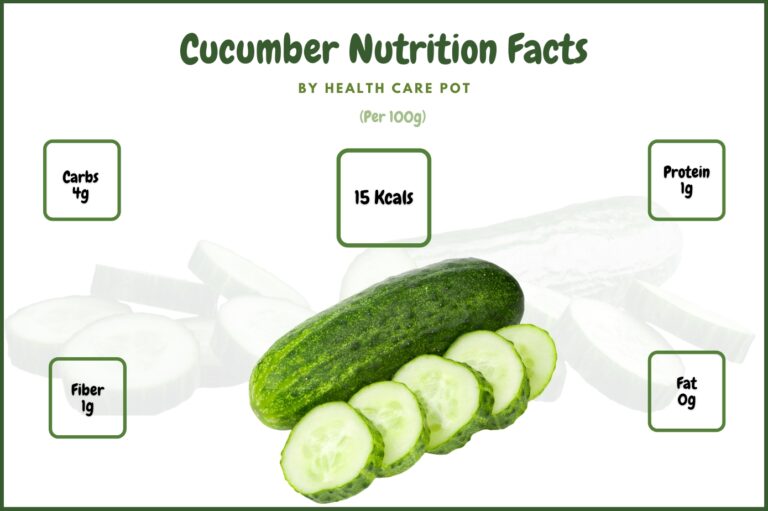Cucumbers are super water-rich as they have 95% water, making them low-calorie fruit. It has lots of health benefits; let's check it.
Cucumbers are mostly produced in China (statics from 2020). The cucumber's scientific name is 'Cucumis sativus'. It is used commercially for making pickles.
Cucumber Nutrition Facts
Here below table shows the cucumber nutrition facts 100g.
Serving size 100 g
Servings per container 1 Calories from Fat 0 * Percent Daily Values are based on a 2,000 calorie diet. Your daily values may be higher or lower depending on your calorie needs.Nutrition Facts
Amount per serving
Calories 15
% Daily Value*
Total Fat 0g
0%
Saturated Fat 0g
0%
Trans Fat 0g
Cholesterol 0mg
0%
Sodium 2mg
1%
Total Carbohydrate 4g
2%
Dietary Fiber 1g
4%
Sugars 2g
Protein 1g
About 100 grams of cucumber have 65 Kcals, 0 grams of fat, 4 grams of carbohydrates, and 1 gram of protein.
There is no cholesterol in the cucumber. It holds 2 mg of sodium.
Calories:
100 grams of cucumbers have 15 Kcals(65 kJ). It is low-calorie food because it includes 95% water. Most of the calories come from carbohydrates.
100 grams of cucumbers hold 4 grams of carbohydrates, 1 gram of fiber, and 2 grams of natural sugar. In 100 grams of cucumbers, Net carbs(Total Carbs-Fiber) should be 3 grams.
Cucumber doesn't contain fat(or contain less than 0.5g).
100 grams of cucumbers contain 1 gram of protein.
Glycemic Index:
The glycemic index of cucumbers is 15. It holds a low glycemic index.
Vitamins And Minerals In Cucumbers
Vitamines | Content | Minerals | Content |
|---|---|---|---|
Vitamin C | 2.8 mg | Calcium | 16 mg |
Vitamin A | 5 mcg | Phosphorus | 24 mg |
Vitamin E | 0.03 mg | Potassium | 147 mg |
Vitamin K | 16.4 mcg | Iron | 0.28 mg |
Vitamin B1 | 0.027 mg | Magnesium | 13 mg |
Vitamin B2 | 0.033 mg | Zinc | 0.2 mg |
Vitamin B3 | 0.098 mg | Copper | 0.041 mg |
Vitamin B6 | 0.04 mg | Manganese | 0.079 mg |
Vitamin B9 | 7 mcg |
100 grams of cucumbers can have Vitamin C(3%), Vitamin A(1%), Vitamin E(0%) and Vitamin K(14%) of your RDA(Recommended Dietary Allowances).
Vitamin C enhances immunity; Vitamin A benefits your heart, lungs, and other organs to work properly; Vitamin E conserves healthy skin and eyes; and Vitamin K is necessary for blood clotting and healthy bones.
Cucumbers also have an adequate amount of B vitamins. 100 grams of cucumbers can have Vitamin B1(thiamin) 2%, Vitamin B2(riboflavin) 3%, Vitamin B3(niacin) 1%, Vitamin B6 (pyridoxine) 3%, and Vitamin B9(folate) 2% of your RDA(Recommended Dietary Allowances). These vitamins require for digestion and proper nerve function.
Minerals are also needed for the body's health. Let's check its portion value.
100 grams of cucumbers have Calcium 1%, Phosphorus 1%, Potassium 7%, Iron 2%, Magnesium 3%, Zinc 2%, Copper 5%, and Manganese 3% of your RDA (Recommended Dietary Allowances).
Calcium supports our bones; Phosphorus plays an essential role in inventing DNA and RNA; Potassium controls fluid balance; Iron lowers tiredness and fatigue; Magnesium maintains muscle, nerve function, and energy production.
Zinc plays a significant role in building proteins; Copper makes red blood cells; Manganese supports the body in creating connective tissue, bones, and blood clotting factors.
Cucumbers Benefits:
Cucumber benefits for skin:
Cucumbers have lots of skin benefits. Putting a cucumber slice on your eyes for 5-10 minutes makes you feel fresh. It reduces dark spots and clear acne pimples. Cucumbers contain more water, making you hydrated in summer. It has lots of skin benefits also when you eat it.
Cucumbers benefit weight loss:
Low-calorie foods help a lot in the weight loss or fat loss process. Cucumbers have very few calories. 100 grams of figs has just 15 Kcals. It is the perfect food for a gym buddy who wants to build muscles and weight loss.
Comment down your suggestions and queries in the comment section. We will love to hear from you.
Frequently Asked Questions(FAQ):
Yes, cucumber has very few calories, low in carbs, and no fat. You can eat it regularly.
When you eat cucumber at night, you will feel bloated, and it will interrupt your night's sleep. So better to eat it between two meals and before sunset.
The cucumber contains 95% water, keeping you hydrated for a longer period. Then you don't need to drink water before it.


1 thought on “Cucumber Nutrition Facts And Health Benefits”